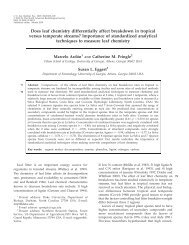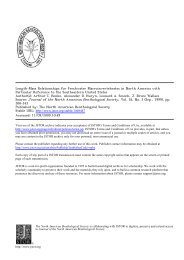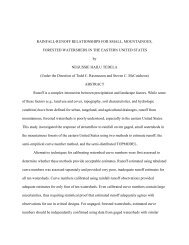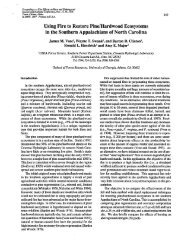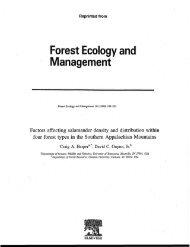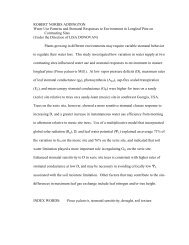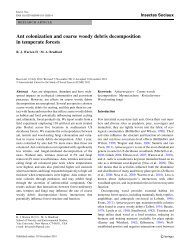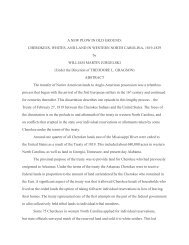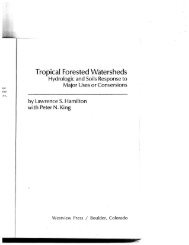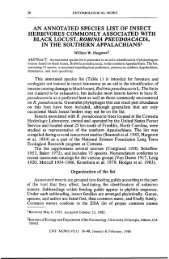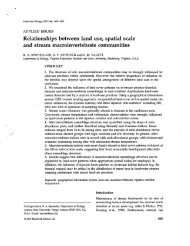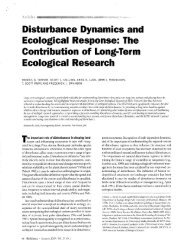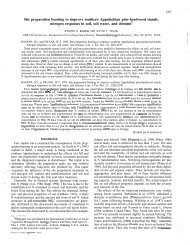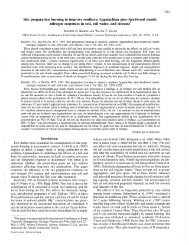biology join - Coweeta LTER - University of Georgia
biology join - Coweeta LTER - University of Georgia
biology join - Coweeta LTER - University of Georgia
You also want an ePaper? Increase the reach of your titles
YUMPU automatically turns print PDFs into web optimized ePapers that Google loves.
Articles<br />
Science and Society: The Role <strong>of</strong><br />
Long-Term Studies in Environmental<br />
Stewardship<br />
Charles T. DrisColl, KaThleen F. lamberT, F. sTuarT Chapin iii, DaviD J. nowaK, Thomas a. spies,<br />
FreDeriCK J. swanson, DaviD b. KiTTreDge Jr., anD Clarisse m. harT<br />
Long-term research should play a crucial role in addressing grand challenges in environmental stewardship. We examine the efforts <strong>of</strong> five Long<br />
Term Ecological Research Network sites to enhance policy, management, and conservation decisions for forest ecosystems. In these case studies,<br />
we explore the approaches used to inform policy on atmospheric deposition, public land management, land conservation, and urban forestry,<br />
including decisionmaker engagement and integration <strong>of</strong> local knowledge, application <strong>of</strong> models to analyze the potential consequences <strong>of</strong> policy<br />
and management decisions, and adaptive management to generate new knowledge and incorporate it into decisionmaking. Efforts to enhance<br />
the role <strong>of</strong> long-term research in informing major environmental challenges would benefit from the development <strong>of</strong> metrics to evaluate impact;<br />
stronger partnerships among research sites, pr<strong>of</strong>essional societies, decisionmakers, and journalists; and greater investment in efforts to develop,<br />
test, and expand practice-based experiments at the interface <strong>of</strong> science and society.<br />
Keywords: boundary spanning, environmental policy and management, Long Term Ecological Research Network, science communication<br />
The growing urgency and complexity <strong>of</strong> challenges to<br />
global sustainability demands new approaches for engaging<br />
the intellectual capital <strong>of</strong> expert communities worldwide.<br />
To meet this demand, the scientific and social-science communities<br />
must expand their capacity to work at the interfaces<br />
between ecological science and environmental policy,<br />
natural-resource management, and conservation. The need<br />
for stronger, more-reliable linkages between science and<br />
society is well documented in both popular media and the<br />
academic literature (e.g., Lubchenco 1998).<br />
The US National Science Foundation (NSF) recognized<br />
the importance <strong>of</strong> translating the benefits <strong>of</strong> research for<br />
society by establishing its “broader impacts” review criterion<br />
in 1997. In 2002, the NSF’s 20-year review <strong>of</strong> the Long Term<br />
Ecological Research (<strong>LTER</strong>) Network recommended that<br />
the <strong>LTER</strong> Network program assume a more powerful and<br />
pervasive role in informing environmental solutions at local,<br />
national, and international levels. In 2005, the Ecological<br />
Society <strong>of</strong> America (ESA) established the foundation for<br />
its Earth Stewardship initiative (Chapin et al. 2011) when it<br />
recommended that ecologists must play a greatly expanded<br />
role in communicating their research and influencing policies<br />
and decisions that affect the environment. It is critical<br />
for the <strong>LTER</strong> Network and for other ecosystem research<br />
programs to move beyond broad calls for action and to build<br />
deliberate and effective long-term relationships between<br />
ecological science and environmental decisionmaking. In<br />
this article, we illustrate, as do the other authors in this<br />
special section (e.g., Thompson et al. 2012 [in this issue]),<br />
the growing role that <strong>LTER</strong> is playing to enhance science<br />
engagement with local, regional, and national policy and<br />
management issues. To develop such programs, the scientific<br />
community needs to build experience and learn from<br />
practical examples <strong>of</strong> effective synthesis and integration <strong>of</strong><br />
<strong>LTER</strong> to meet the needs <strong>of</strong> society. In this article, we present<br />
and discuss five case studies <strong>of</strong> work at the interface <strong>of</strong> science,<br />
policy, and management from forested <strong>LTER</strong> Network<br />
sites across the United States. We distill a set <strong>of</strong> common<br />
strategies, lessons, and recommendations for improving and<br />
expanding interface efforts to improve the ability to meet the<br />
grand challenges in environmental science <strong>of</strong> our time.<br />
Effective science interface efforts<br />
Although the integration <strong>of</strong> science and society is <strong>of</strong>ten<br />
viewed as a relatively narrow issue <strong>of</strong> a need for more and<br />
better science communication, programs that build stronger<br />
interfaces between science and society require attention to<br />
the full range <strong>of</strong> boundary-spanning activities, such as public<br />
engagement, decision-relevant synthesis, distillation <strong>of</strong><br />
results, and science translation and dissemination, through<br />
BioScience 62: 354–366. ISSN 0006-3568, electronic ISSN 1525-3244. © 2012 by American Institute <strong>of</strong> Biological Sciences. All rights reserved. Request<br />
permission to photocopy or reproduce article content at the <strong>University</strong> <strong>of</strong> California Press’s Rights and Permissions Web site at www.ucpressjournals.com/<br />
reprintinfo.asp. doi:10.1525/bio.2012.62.4.7<br />
354 BioScience • April 2012 / Vol. 62 No. 4 www.biosciencemag.org



